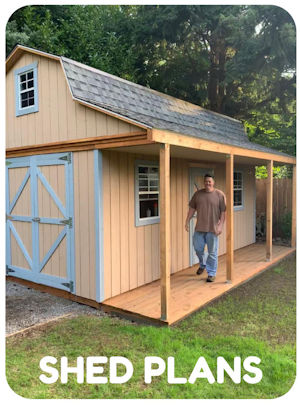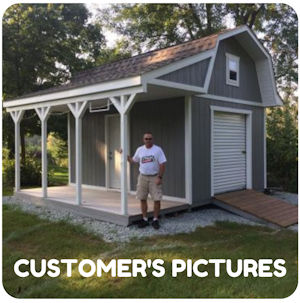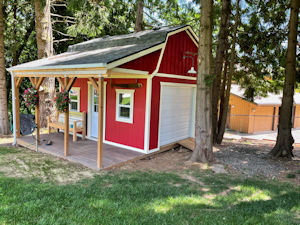Save 30% off Any Shed Plan Purchase!
Signup For My 'Shed n Sight' Newsletter
and Get Your 30% off Promo Code To Use At Checkout.
- Home
- How to build a shed
- What's your best shed size to build?
What is the best shed size for you and your backyard?
Choosing the perfect shed size for your backyard can feel like an overwhelming task, especially with the wide range of sizes and styles available. The first step is to consider your specific needs. Are you looking to store garden tools, your riding mower, or other larger items?
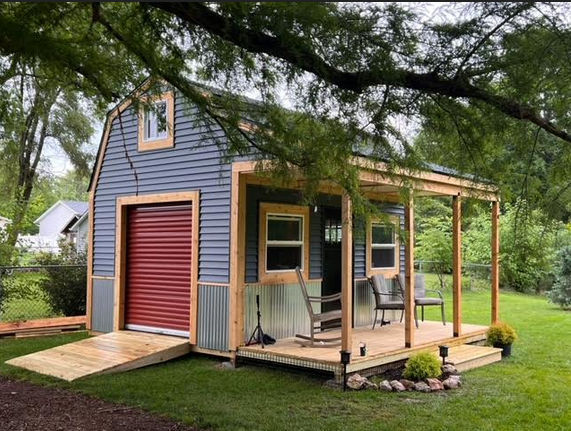 What's Your Best Shed Size?
What's Your Best Shed Size?Or perhaps you're after a gardening workspace, a workshop, or a home office? When it comes to choosing the best shed size for your backyard, understand that you have a wealth of options. There is no right or wrong choice – what matters most is your unique situation.
The right shed size for your backyard depends on your storage needs and the size of the space you have available in your backyard. For instance, the standard sizes of sheds are great if you're planning to store smaller items, like a lawn mower, push mower, garden supplies, or basic power tools.
Consider the different shed sizes
Most popular shed sizes tend to fall into three categories: small (up to 80 sq ft), medium (up to 120 sq ft), and large (over 120 sq ft). Let's dive a bit deeper into these categories, discussing the advantages and potential downsides of each.
What about the small shed size?
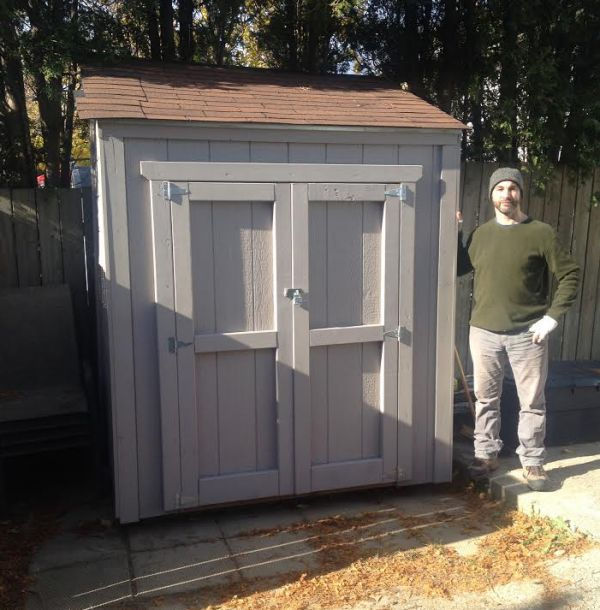 This Lean To Shed Would Be Considered In The Small Shed Size Category
This Lean To Shed Would Be Considered In The Small Shed Size CategoryA small shed of up to 80 square feet, for example an 8x10 shed, may be your best bet if you simply need extra storage for garden tools and equipment. It's a great option for smaller lawns, providing enough room without overwhelming your outdoor space. It's quite friendly to your budget too, lowering the overall cost of building a shed compared to larger structures.
Or how about the medium shed size?
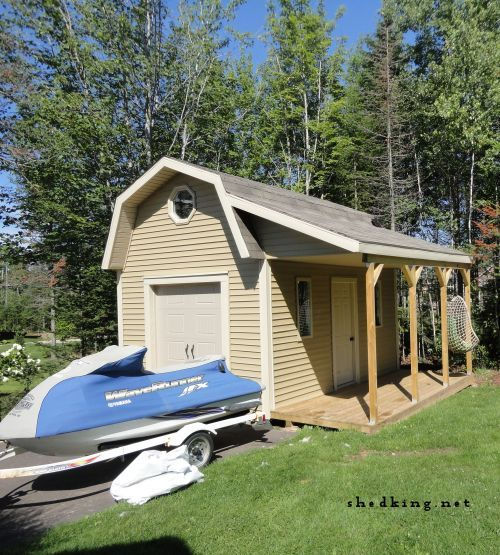 This Medium Size 10x12 Shed With Porch Is Perfect For This Home Owner!
This Medium Size 10x12 Shed With Porch Is Perfect For This Home Owner!Medium sheds, for example a 10x12, allow for more storage capacity. With these, you’d have ample space for a push mower, a snow blower, and average-sized power tools. Plus, if the mood strikes, they can potentially double as a compact workspace.
Alright, maybe the large shed sizes might be best for you!
Stepping up to a large shed, 12x16 or larger, you're looking at a storage mammoth for heavier equipment and even recreational vehicles. They provide so much room, it could feel like adding a small building to your backyard. Known for their larger space, these sheds can also double as a garden workspace, home office,or a pool house.
If you are wanting to build yourself a nice workshop, then I wouldn't even consider going with less than a 12'x16' size shed.
When deciding on whether to go for smaller, medium, or large sheds, it's essential to consider how it will affect your outdoor space. Will it fit within your property lines? Many counties across the country will not allow you to place a shed within 10' of your property line.
The reason for this is so that utility trucks and the like have easy access to power lines, phone lines, etc. Will the shed be so large it would be infringing on your open area for relaxation and play? And of course, will it comfortably hold the items you plan on storing inside?
This brings up another factor which I always recommend with my shed plans - get a building permit! This is another added cost of building your backyard shed, but will insure that you are following local regulations.
If you can't decide on the right shed size, bigger is better!
If you're down to two or three shed dimensions and cannot decide which one is the best, I recommend going for the larger one. It's better to have more space than not enough. Given how storage needs tend to grow, it's a decision most folks are happy about down the road.
Don't forget to factor in the size of the larger items you might need to store, like those big lawn mowers. Can they easily move through the door? Is there enough room not just for storage, but for movement and little maintenance tasks within the shed?
If you're storing large equipment like a riding mower, then obviously, you'll need a larger shed. Speaking of storing larger items in a shed, this brings up the issue of how big your shed doors will or can be.
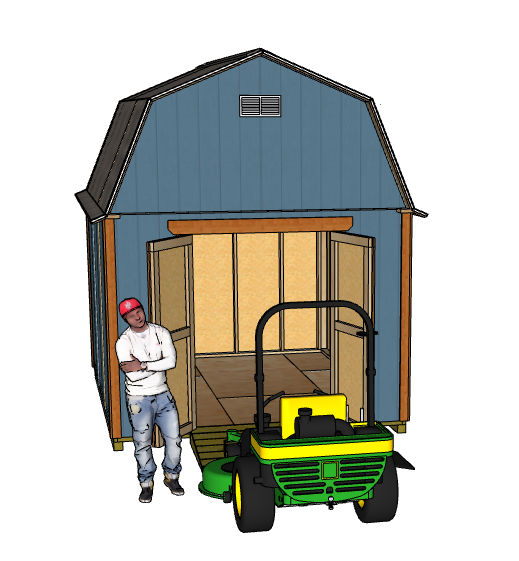 Oh Oh! He Didn't Make His Shed Doors Big Enough!
Oh Oh! He Didn't Make His Shed Doors Big Enough!With most of my shed plans, when planning out the width of double shed doors, I never really make them larger than 60". This allows you to make each door at 30". If you need to go larger than this, I would recommend installing a roll up shed door to accommodate your needs.
The shed size you choose will affect the cost!
Cost is another important factor to consider. The larger your shed, obviously the greater will be the material and labor costs. A shed builder may build you a great looking shed, but consider this. He may use regular 1x's for the trim rather than going with say cedar or pvc trim.
This may look great from the beginning, but down the road after your shed has has a chance to weather, cheaper materials will deteriorate much faster and you'll be sorry you didn't go with the cedar or pvc trim. Other factors such as not having drip edge on your roof edges, or felt paper under the shingles will cause deterioration issues. So the point here is this: don't skimp on building materials for your shed.
You wouldn't do this for your home, so don't do it for your shed either. Sheds can be a major investment if built properly and done right. If you decide to go with a poorly built shed, it's not going to last you as long as it should and you may up having to replace the roof, or the trim, or your doors may sag and deteriorate. Do it the best you can from the git go!
The style of your shed will affect the size!
Another factor that needs to be considered is the style of the shed. Most common shed sizes come in 4 main shed styles ( or roof styles) to look at.
1. Barn style roof.
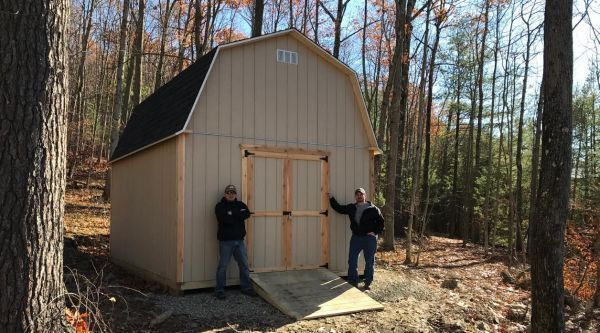 Barn Style Sheds May Cost Your More!
Barn Style Sheds May Cost Your More!If you are looking for as much space as you can get for the foot print, then I would suggest going with a barn style shed. Typically these sheds have lofts that provide additional space more so than any of the other following style sheds. So for the footprint, barn sheds offer the most storage space. However, the cost will go up for the additional storage you're going to get!
2. Gable style roof.
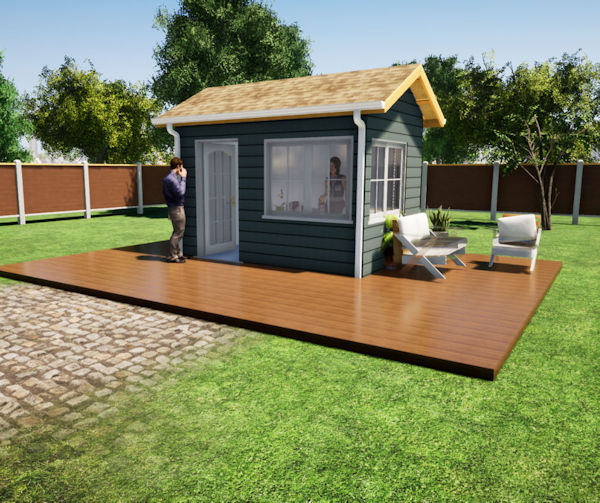 8x12 Shed With A Gable Style Roof
8x12 Shed With A Gable Style RoofDepending on the slope of the roof, you may have ample storage for your needs in this attic. These sheds typically are easier to build. I very often see she sheds built with this style roof.
3. Lean to Style roof.
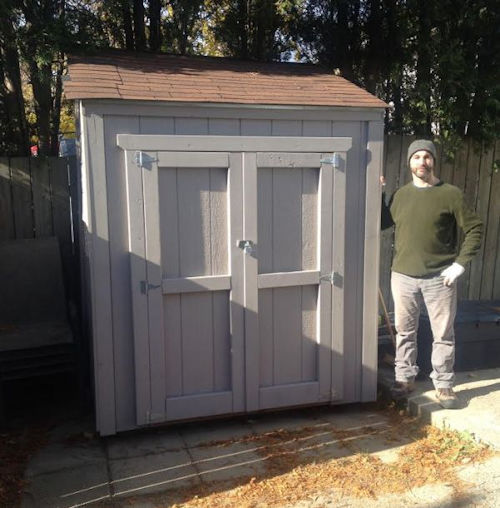 Lean-to Style Shed Roof
Lean-to Style Shed RoofThis style shed is also very easy to build but virtually no attic space. You see these a lot of times built on to the sides of garages or added to shed structures for a cost effective way of adding more storage space. Not everybody has large backyards, and in these cases, the size of your shed needs to be scaled down. If you have a small yard but still need some additional storage, a lean-to shed can be a perfect choice. They are handy, compact, and can be fixed against an existing wall, making optimum use of the limited space.
4. Saltbox Style roof.
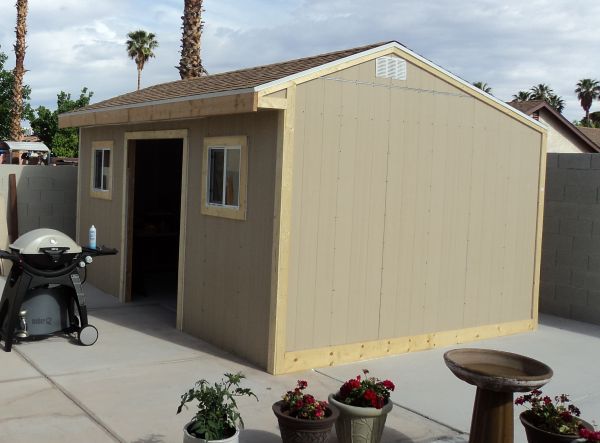 Saltbox Style Shed
Saltbox Style ShedThis style shed has lots of character and I like to think of them as really nice looking garden sheds in backyards.
Check your local building codes
It's also a good idea to check with your local municipality or homeowners association about any regulations or limits on shed sizes. You don't want to invest in a large storage building, only to find out it violates local building codes or association rules.
On the other hand, if you have a large outdoor space and big storage needs, then a larger building will be your best bet. An added perk is, it can also serve as a workspace, shelter for your boat or recreational vehicle, or even an additional living space like a guest house or even an airbnb!
Shed height may be an important factor to consider also!
Speaking of various sizes, square feet isn't the only dimension to consider! You need to think about the height of the shed as well. Can you easily stand inside it? Can you store large items on shelving or hang them from hooks on the ceiling?
In one of the adjacent counties to mine, sheds are not allowed to be higher than 12'! Check to make sure your county doesn't have height restrictions. It would be devastating to build your shed, then a building inspector would happen to be driving by and notice that you have a really tall shed. They'll either make you make the modification to get it down to the right height, tear it down all together, or make you pay for a special variance to get your shed approved!
Consider possible future plans for your shed size
Having plenty of space also goes beyond just fitting your belongings. You'll want some extra room for future acquisitions. We all know how easy it is to accumulate more tools, gardening equipment, or even holiday decorations over time. Plan with future storage needs in mind!
Think about the extras you might want in your shed as well: shelves, hangars, bins for small parts. These add to the cost but also to the shed's functionality. As a closing note on the budget, it's smart to work with a range and try to get the most value for whatever price you're comfortable with.
Ways to see if your shed size will work in your backyard
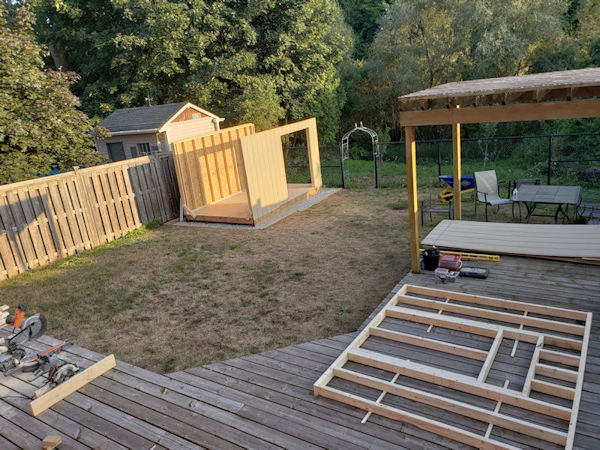 This shed just may be too close to the property lines!
This shed just may be too close to the property lines!One of the best ways to decide on your shed size is to mark out the dimensions in your backyard. You can use stakes and strings or even just lay out a garden hose in the shape and size of the shed you're considering. This gives you a literal feel for how it will fit into your landscape.
Use 3d virtual reality models to help decide your shed size
The link below is an example of how you can use a 3d shed model. Open up the link below with your smartphone in your backyard. Click on the 'goggle' looking link. Then with your smartphone you can view the shed in virtual reality in the location where you want to build your shed and actually see how it will look in the space!
If you have a VR headset, even better!
I have 3d models of all my sheds and you can check them out here.
Aesthetics are also important in determining shed size
When it comes to your new shed, make sure the style and size fit in with the aesthetics of your backyard. A huge shed can dominate a small yard and look out of place. Conversely, a tiny shed could look lost in a large yard.
It's also beneficial to locate your shed in a place that's easy to get to. For example, if you’re planning on storing garden equipment, it makes sense to have the shed closer to the garden.
Shed pictures may help you determine your shed size
Want some shed ideas? Try doing a bit of online research or browse a shed dealer's gallery. Seeing what others have done can inspire you and even offer solutions to challenges you may face. I have a ton of pictures sent to me from my shed plan customers. Check out their pictures for inspiration here.
Your building budget is a big factor for shed size decisions
Another important factor to consider is the siding to use on your shed your choice here depends on your personal taste, budget, and specific needs. Sheds with vinyl siding require the least amount of maintenance. Going with wood siding like T1-11 which comes in 4'x8' panels will require that you paint it or treat it.
This will need to be repeated every so often down the road. One type of siding that I really like and it's the one that I show most often with my shed plans is LP Engineered, pre-primed siding panels or lap siding. The LP stands for Louisiana Pacific and that is the manufacturer of the siding. It is much more expensive to use but comes with a very long life if installed properly.
Do you need to add heating and cooling to your shed?
If you plan on using your shed for an office shed, a workshop, or possibly a shed house where you'll need to heat and cool, you'll need to insulate and ventilate properly. This is also an additional expense you will need to consider. But this might also force you to re-consider your siding options.
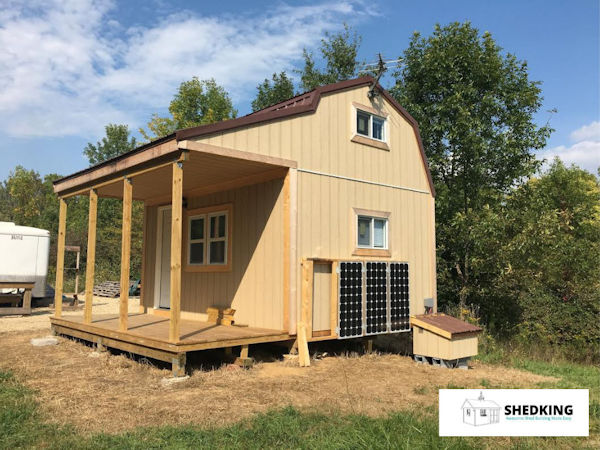 Heating and Cooling Options May Affect Your Shed Size Decisions
Heating and Cooling Options May Affect Your Shed Size DecisionsTypically with standard house construction exterior walls are insulated, have a plywood or osb layer on the exterior of the wall studs, house wrap, then the siding on top of that. So if you just go with T1-ll siding or LP Siding panels, you're not going to have the efficiency you'll want or need to keep your shed heated and cooled properly.
What's the best shed size? Here's my personal opinion..
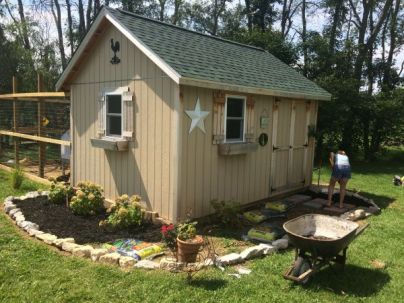 What Is The Perfect Shed Size - Mine Is The 12'x16'!
What Is The Perfect Shed Size - Mine Is The 12'x16'!For ease of building considering the building dimensions, I personally prefer the 12' x 16' shed size!
Why you ask?
For one, it's not too big, and it's not to small. The dimensions are even, and this makes this shed size one that makes optimal use of lumber sizes - specifically 12' boards and 16' boards.
You can build your garden shed, shed house, workshop, craft studio, music studio, home office - well heck, just about any purpose shed you need, the 12'x16' fits the bill.
Here's a 12x16 home office shed
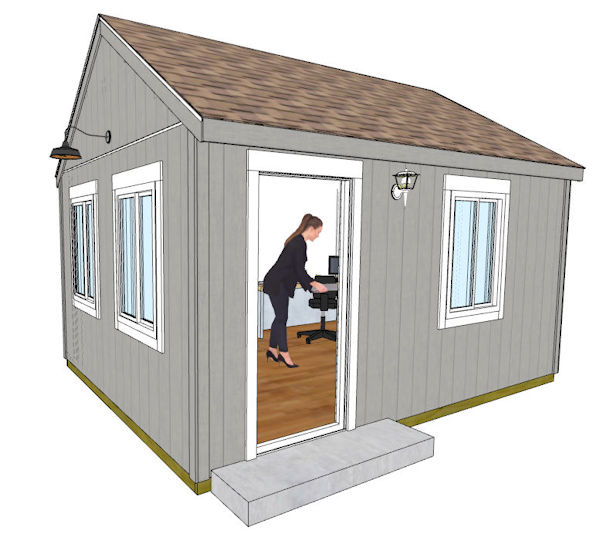 My 12x16 Home Office Shed Plans - The Perfect Shed Size!
My 12x16 Home Office Shed Plans - The Perfect Shed Size!Here's a 12x16 workshop shed interior
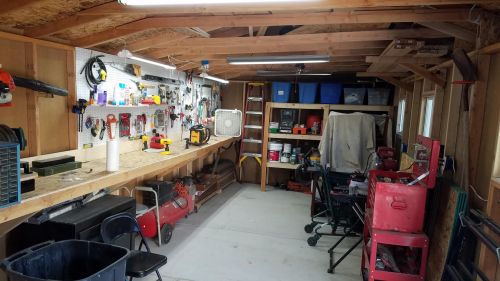 Plenty of Space With This 12'x16' Workshop Shed
Plenty of Space With This 12'x16' Workshop ShedWhat about a 12'x16' shed house!
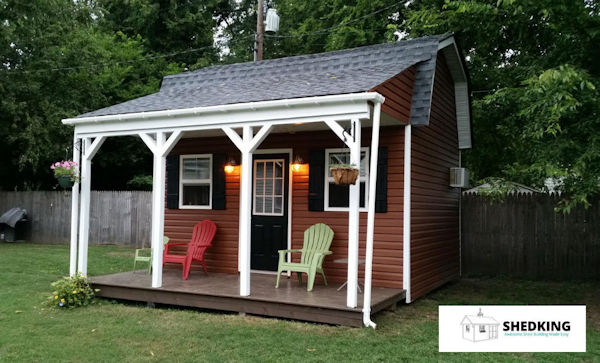 This 12'x16' Shed Is A Shed House With Side Porch!
This 12'x16' Shed Is A Shed House With Side Porch!Click here to see all my 12'x16' shed plans that might help you decide on 'What's the best shed size' for you to build!
Hopefully, my insights into determining the best shed size has given you some direction and confidence in your quest for a new shed. Remember, the best shed size for your backyard balances all your needs, from storage capacity to budget to aesthetics. I know you will find the perfect solution! Happy shed hunting!
Monthly DIY
Shed-in-sight
Newsletter
Subscribing will get you discounts on shed plans, monthly updates, new shed design ideas, tips, exclusive discounts on shed building resources and tools. Learn more here.
Recent Articles
-
Barn Shed Plans with Big Lofts
Dec 20, 25 08:03 AM
My barn shed plans come with full email support, detailed building guides, materials lists, and they are cheap too! -
Pictures of Sheds Built By Shedking Customers
Dec 07, 25 07:39 AM
Visit our library of pictures of sheds built from our shed plans. Get great shed design ideas and plans for storage sheds, garden sheds and more. -
How To Solar Power A Shed
Oct 24, 25 09:28 AM
how to solar power a shed
My You Tube Videos



